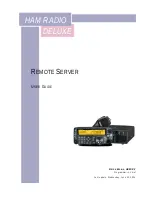
2: Introduction
EDS1100/2100 Device Server User Guide
19
SSH and SSL are able to do the following:
Verify the data received came from the proper source
Validate that the data transferred from the source over the network has not changed when it
arrives at its destination (shared secret and hashing)
Encrypt data to protect it from prying eyes and nefarious individuals
Provide the ability to run popular M2M protocols over a secure SSH or SSL connection
In addition to keeping data safe and accessible, the EDS1100/2100 has robust defenses to hostile
Internet attacks such as denial of service (DoS), which can be used to take down the network.
Moreover, the EDS1100/2100 cannot be used to bring down other devices on the network.
You can use the EDS1100/2100 with the Lantronix Secure Com Port Redirector (SCPR) to
encrypt COM port-based communications between PCs and virtually any electronic device. SCPR
is a Windows application that creates a secure communications path over a network between the
computer and serial-based devices that are traditionally controlled via a COM port. With SCPR
installed at each computer, computers that were formerly “hard-wired” by serial cabling for security
purposes or to accommodate applications that only understood serial data can instead
communicate over an Ethernet network or the Internet.
Terminal Server/Device Management
Remote offices can have routers, PBXs, servers and other networking equipment that require
remote management from the corporate facility. The EDS1100/2100 easily attaches to the serial
ports on a server, Private Branch Exchange (PBX), or other networking equipment to deliver
central, remote monitoring and management capability.
Troubleshooting Capabilities
The EDS1100/2100 offers a comprehensive diagnostic toolset that lets you troubleshoot problems
quickly and easily. Available from the Web Manager, CLI, and XML interfaces, the diagnostic tools
let you:
View critical hardware, memory, MIB-II, buffer pool, and IP socket information.
Perform ping and traceroute operations.
Conduct forward or backup DNS lookup operations.
View all processes currently running on the EDS1100/2100, including CPU utilization and total
stack space available.
Configuration Methods
After installation, the EDS1100/2100 requires configuration. For the unit to operate correctly on a
network, it must have a unique IP address on the network. There are four basic methods for
logging into the EDS1100/2100 and assigning IP addresses and other configurable settings:
DeviceInstaller:
Configure the IP address and related settings and view current settings on the
EDS1100/2100 using a Graphical User Interface (GUI) on a PC attached to a network. See
Chapter 5: Using DeviceInstaller
Web Manager:
Through a web browser, configure the EDS1100/2100 settings using the
Chapter 6: Configuration Using Web Manager
.
















































